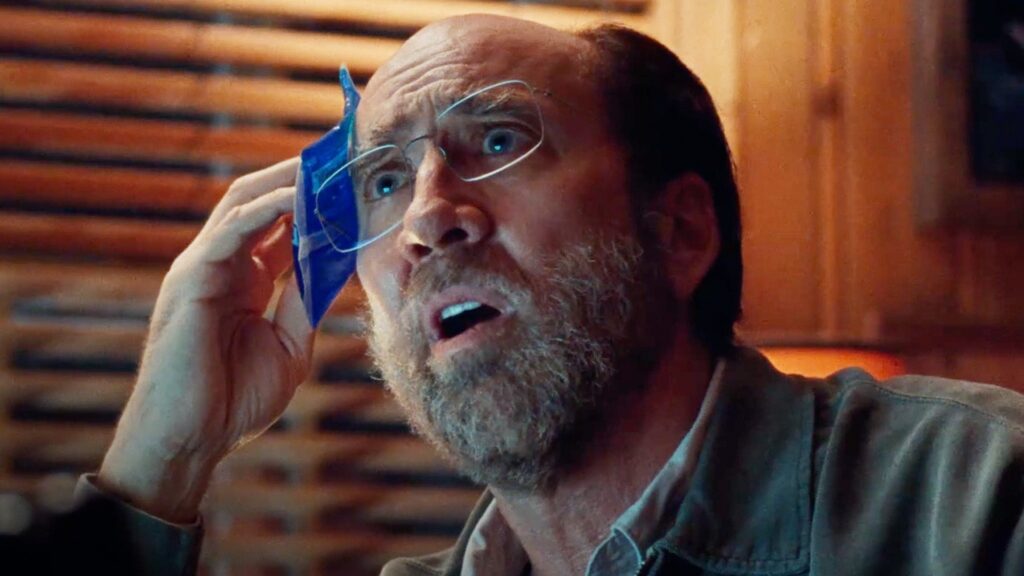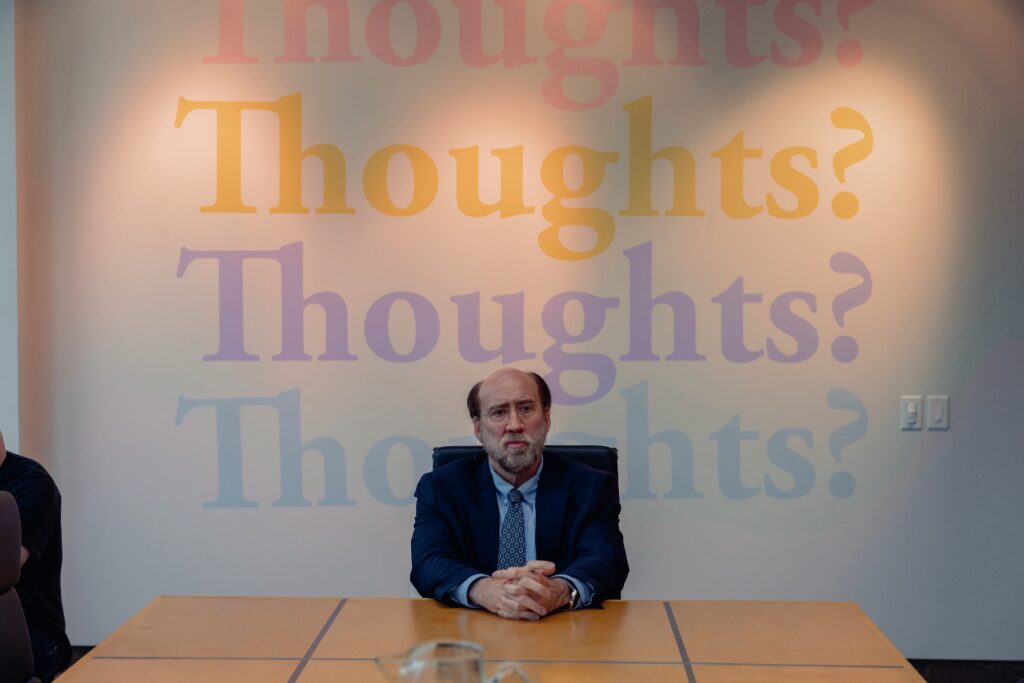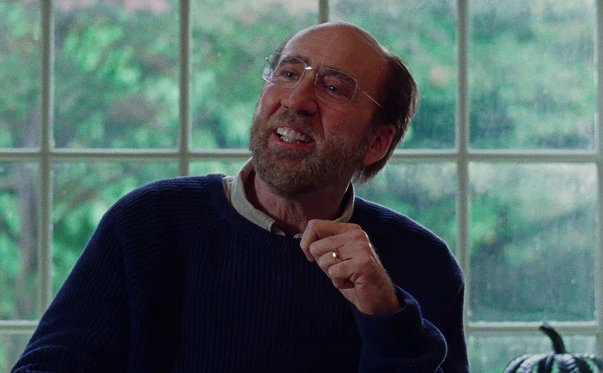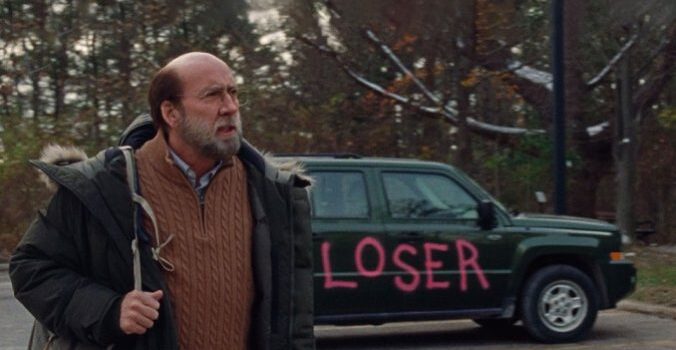By Alex McPherson
A creative, darkly comic story of self-destructive ego and fame’s dehumanizing effects, director Kristoffer Borgli’s “Dream Scenario” is never less than engaging — with an outstanding Nicolas Cage performance — but can’t meld its timely ideas into a fully cohesive whole.
Borgli’s film follows Paul Matthews (Cage), a tenured university professor teaching evolutionary biology to disinterested students — he’s unfulfilled professionally and seeking recognition in his field. Paul wants to publish a book on his research and fumes that a former colleague (that he hasn’t seen in 30 years) beats him to the punch, allegedly stealing his theory of “Ant-elligence” for her own writing venture. It’s a critical blow to his ego.
At home, Paul has a loving wife, Janet (Julianne Nicholson), and two daughters, Sophie (Lily Bird) and Hannah (Jessica Clement). By most accounts, Paul has a pretty privileged life, but he seeks more — quietly experiencing a midlife crisis within his self-loathing headspace. His seemingly simple yearnings belie a misguided sense of entitlement and ungratefulness.
Out of the blue, Paul appears in Sophie’s dream: he casually observes as random objects crash onto their outdoor patio and Sophie is lifted into the sky, making no effort to rescue her. Randomly, old connections, students, and, eventually, people all over the country he’s never met start seeing Paul in their dreams as well. Just like with Sophie, Paul awkwardly (and humorously) observes in the background as the dreamer experiences some dramatic event — such as crocodile infestation, tooth extraction, or a not-so-friendly neighborhood demon.

Paul is initially thrilled by the attention, albeit disappointed at his “inadequacy” within the situations themselves. He’s on the news, students line up to take selfies with him, and his family sees him in a new light. Janet, especially, sees glimmers of the confident man she fell in love with, yet grows increasingly jealous, since Paul doesn’t appear in her own dreams.
Paul is even contacted by a PR group (called “Thoughts?”), led by Trent (Michael Cera), who wants Paul to sponsor big brands so he can “dreamfluence” people in their slumber. At the end of the day, all Paul wants to do is get a book published on his scholarship, which he hasn’t actually started writing yet, and maybe get invited to dinner by a wealthy colleague.
Before long, Paul’s narcissism grows. His dream-world persona suddenly takes on a more nefarious role in peoples’ sleep states; he’s now a monster haunting with gleefully violent abandon. Thus begins Paul’s descent into the throes of Cancel Culture, digging his own grave as society ostracizes him — initially for forces beyond his control — reckoning with celebrity and his own self-absorption as his previously stable lifestyle falls apart.
Indeed, “Dream Scenario” certainly has a lot on its mind. Although the film doesn’t hit bullseyes on all its targets, Borgli crafts a trenchant commentary on society’s mindlessness — oscillating between hilarity, horror, and pathos that keeps viewers on their toes. And there’s no more fitting person than Cage to lead the way, in a role that gives him space to showcase his considerable range as a performer.

Cage — himself a celebrity who’s been “memeified” by the masses as an over-the-top cartoon character — lends both humanity and zaniness to his portrayal. He renders Paul (balding, with a nasally whine of a voice) a character that’s easy to poke fun at, but also to empathize with. Cage successfully portrays Paul as an irritating, sympathetic, fragile person, going effectively bonkers in the frightening and at-times shockingly violent nightmares. Whether unhinged or grounded, Cage clearly relishes the role as an opportunity to reject being pigeonholed into one acting style. Borgli, too, refuses to paint Paul in black-and-white absolutes.
Borgli’s screenplay encourages viewers not to root for or against Paul as the collateral damage piles up. Nor does Borgli vilify the masses who launch Paul into stardom and, subsequently, the cultural garbage bin. Rather, “Dream Scenario” depicts a world that abuses the idea of celebrity, simultaneously punishing Paul’s dependence on being seen and admired without taking responsibility for his own happiness.
It’s also quite funny, containing one of the best cinematic farts to ever grace the silver screen. This tonal imbalance can be distracting, for sure, though maybe that’s the point, reflecting Paul’s separation from his modest beginnings. Paul’s world is crumbling before his eyes — the public plays satirical whack-a-mole with his feelings. This brings comedy and tragedy to the table, making laughs catch in viewers’ throats.
Additionally, by matter-of-factly depicting the film’s nightmare sequences, “Dream Scenario” dares viewers to separate the monstrous incarnation of Paul from his true self. As viewers weave in and out of “lived experience” (jumping into victims’ dreams, which cinematographer Benjamin Loeb frames as slightly-heightened reality), perhaps, the film says, we cannot.

Overall, “Dream Scenario” reveals itself as an absurdist take on human folly that shares similarities with director Ari Aster’s “Beau is Afraid” in manifesting its protagonist’s worst fears (Aster’s a producer on “Dream Scenario”) and punishing them for their cowardice and lack of accountability.
The film’s fatalism, however, is a double-edged sword. Borgli sends Paul down a path with no easy exit or opportunities for redemption (throwing in on-the-nose cultural references meant to provoke). To its credit, what plays out seems plausibly true-to-life in terms of Paul’s reactions and how society treats him. This predictability also breeds hopelessness and lack of resolution, becoming less involving due to its inevitabilities. Once Paul’s life has been suitably demolished, the film seems unsure what to do with him — reflecting Paul’s own sad aimlessness, yet remaining incomplete as a story.
Besides Paul, supporting characters of varying complexity are brought to life by an ensemble committed to the craziness. Nicholson brings warmth, sass, and heartbreak to her role as Janet, dealing first-hand with the fallout of Paul’s declining mental state and selfishness. Cera is excellent at delivering his dryly comedic dialogue, as are Kate Berlant and an uncomfortably hilarious Dylan Gelula as his associates. Tim Meadows steals scenes as Paul’s department head reconciling his friendship with Paul with the pariah he becomes.
Altogether, “Dream Scenario” is a bizarre, unconventionally compelling watch — calling out people like Paul and our social-media-obsessed, consumerist society at large — content to unsettle and leave threads dangling. Third-act clunkiness notwithstanding, it’s a one-of-a-kind work difficult to forget.

“Dream Scenario” is a 2023 comedy written, directed and edited by Kristoffer Borgli and starring Nicolas Cage, Julianne Nicholson, Tim Meadows, Michael Cera and Dylan Gelula. It is Rated R for language, violence and some sexual content. and its run time is1 hour, 43 minutes. It opens in theatres Dec. 1.Alex’s Grade: B+.

Lynn (Zipfel) Venhaus has had a continuous byline in St. Louis metro region publications since 1978. She writes features and news for Belleville News-Democrat and contributes to St. Louis magazine and other publications.
She is a Rotten Tomatoes-approved film critic, currently reviews films for Webster-Kirkwood Times and KTRS Radio, covers entertainment for PopLifeSTL.com and co-hosts podcast PopLifeSTL.com…Presents.
She is a member of Critics Choice Association, where she serves on the women’s and marketing committees; Alliance of Women Film Journalists; and on the board of the St. Louis Film Critics Association. She is a founding and board member of the St. Louis Theater Circle.
She is retired from teaching journalism/media as an adjunct college instructor.

